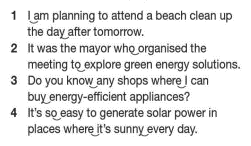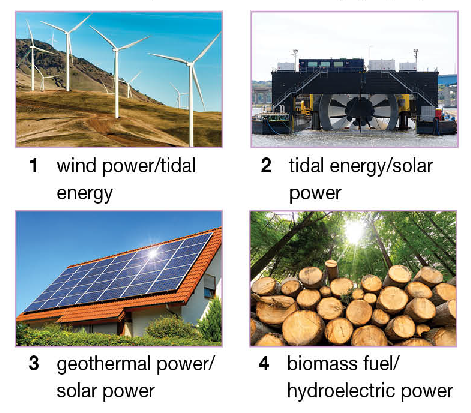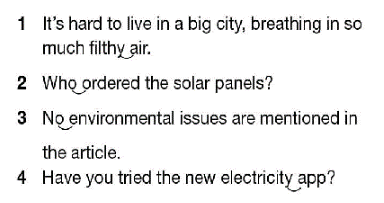Giải SGK, SBT Unit 6. The green movement Bright
Giải SGK, SBT Unit 6 Bright
1. Listen and repeat. Match the green energy sources (1-6) to their descriptions (A-F).
(Nghe và lặp lại. Nối các nguồn năng lượng xanh (1-6) với mô tả của chúng (A-F).)
|
1. ___ biomass fuel 2. ___ hydroelectric power 3. ___ solar power 4. ___ geothermal power 5. ___ tidal energy 6. ___ wind power |
A. uses water from a dam to spin turbines and generate electricity B. transfers the sun's energy into electricity C. is made from plants and animal waste D. uses the power of the ocean's waves to generate electricity E. uses steam within the earth to generate power F. generates electricity from the power of the air |
a) Match the environmental problems (1-6) to the solutions (a-f). Then listen and check.
(Nối các vấn đề môi trường (1-6) với các giải pháp (a-f). Sau đó nghe và kiểm tra.)
|
Environmental problems 1. ___ soil pollution 2. ___ polluted rivers 3. ___ energy waste 4. ___ energy crisis 5. ___ water shortage 6. ___ overloaded landfills |
Solutions a. conserve electricity b. reduce water wastage c. maintain and develop renewable energy sources d. replace disposable items with reusable ones e. improve wastewater treatment f. avoid using harmful chemicals in farming |
4. Match the solutions (1-2) to the examples (a-b) and expected results (c-d).
(Nối các giải pháp (1-2) đến các ví dụ (a-b) và kết quả mong đợi (c-d).)
|
Solution 1. ___ ___ Eliminate technology that wastes energy 2. ___ ___ Upgrade to green homes |
Examples a. Build homes with solar panels and energy-saving insulation b. Replace older appliances with energy-efficient models Expected results c. Less reliance on fossil fuels and lower energy bills d. Less energy wasted and a decreased carbon footprint |
Vocabulary (Từ vựng)
Advantages of renewable energy (Lợi ích của năng lượng tái tạo)
5. Match the words in the two columns.
(Nối các từ trong hai cột.)
|
1. ___ affordable 2. ___ permanent 3. ___ dependence 4. ___ harness 5. ___ abundant 6. ___ maintenance |
a. electricity in nature b. power c. costs d. free source of electricity e. to install f. on fossil fuel |
3. Match the words in the two columns. (Nối các từ trong hai cột.)
|
1. ___ raise 2. ___ a major 3. ___ local 4. ___ serious 5. ___ take |
a. consequences b. communities c. awareness d. action e. problem |









